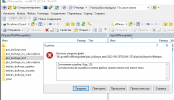We are proud to announce the first release of our new Proxmox Offline Mirror tool.
With the Proxmox Offline Mirror tool, you can manage a local apt mirror for all package updates for Proxmox and Debian projects. From this local apt mirror you can create an external medium, for example a USB flash drive or a local network share, to update systems which cannot access the package repositories directly (or proxied) via the internet. Such systems might be restricted by policies to access the public internet or are completely air-gapped. Finally, you can also manage subscriptions for such restricted hosts.
Documentation
https://pom.proxmox.com
Community Forum
https://forum.proxmox.com
Source Code
https://git.proxmox.com
Bugtracker
https://bugzilla.proxmox.com
FAQ
Q: How can I install Proxmox Offline Mirror?
A: See the installation chapter in the reference documentation.
Q: Do I need a subscription to mirror APT repositories with Proxmox Offline Mirror?
A: No, you do not need a subscription for offline mirroring of APT repositories.
Q: Do I require a subscription to activate subscription keys offline with Proxmox Offline Mirror?
A: Yes, you require a special subscription to activate a subscription key of a Proxmox solution offline. Standard and Premium subscriptions include one for free.
Q: What types of repositories does Proxmox Offline Mirror support?
A: All APT-based repositories should work in theory, but we only test those of Proxmox and Debian projects.
Q: How is offline repository mirroring integrated with Proxmox VE, Proxmox Backup Server or Proxmox Mail Gateway?
A: Offline mirrors can be accessed like ordinary APT repositories. The
Q: What version of Proxmox VE, Proxmox Backup Server or Proxmox Mail Gateway supports offline subscription key activation?
A: See the docs for the minimum Package versions required for managing offline subscriptions.
With the Proxmox Offline Mirror tool, you can manage a local apt mirror for all package updates for Proxmox and Debian projects. From this local apt mirror you can create an external medium, for example a USB flash drive or a local network share, to update systems which cannot access the package repositories directly (or proxied) via the internet. Such systems might be restricted by policies to access the public internet or are completely air-gapped. Finally, you can also manage subscriptions for such restricted hosts.
Documentation
https://pom.proxmox.com
Community Forum
https://forum.proxmox.com
Source Code
https://git.proxmox.com
Bugtracker
https://bugzilla.proxmox.com
FAQ
Q: How can I install Proxmox Offline Mirror?
A: See the installation chapter in the reference documentation.
Q: Do I need a subscription to mirror APT repositories with Proxmox Offline Mirror?
A: No, you do not need a subscription for offline mirroring of APT repositories.
Q: Do I require a subscription to activate subscription keys offline with Proxmox Offline Mirror?
A: Yes, you require a special subscription to activate a subscription key of a Proxmox solution offline. Standard and Premium subscriptions include one for free.
Q: What types of repositories does Proxmox Offline Mirror support?
A: All APT-based repositories should work in theory, but we only test those of Proxmox and Debian projects.
Q: How is offline repository mirroring integrated with Proxmox VE, Proxmox Backup Server or Proxmox Mail Gateway?
A: Offline mirrors can be accessed like ordinary APT repositories. The
proxmox-offline-mirror-helper utility facilitates the setup.Q: What version of Proxmox VE, Proxmox Backup Server or Proxmox Mail Gateway supports offline subscription key activation?
A: See the docs for the minimum Package versions required for managing offline subscriptions.


